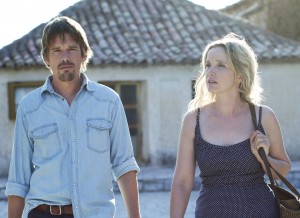Midnight builds on strengths of preceding films
Movie trilogies have a bit of a reputation for being films that rely heavily on action and excitement. They’re usually big money earners, which is why the studios keep going back to the well. Pensive, well-crafted and artful movies usually stand alone, having said all they needed to say in the course of their runtime. Richard Linklater’s Before trilogy takes on both of these conventions, riding the shockwave of their collision to a truly wonderful product.

Perfect timing · Ethan Hawke (left) and Julie Delpy flesh out their emotional chemistry and deliver masterful performances as they reprise their roles as Jessie and Celine from the previous two installments. – Courtesy of Sony Pictures Classics
Before Sunrise came out in 1995. It was small and straightforward: two 20-somethings, Ethan Hawke’s Jesse and Julie Delpy’s Celine, meet on a train in Europe and spend the night walking around Vienna talking about love, life and falling in love in the process. Their conversation flows, fueled by both their immediate chemistry and the suspicion that they will only be together for this one night. The movie is beautiful and perfectly embodies the aforementioned single artful movie paradigm.
Before Sunset came out and is also set nine years later, revisiting these two characters and all the subsequent changes that occurred in their lives. It was a big surprise to many when it was announced, in part because it ruined the beautiful ending of the first installment. However, the wonderful interaction between Jesse and Celine made any complaints moot. The movie is essentially one long conversation between the two again, this time in Paris, and the dampened Sunrise ending was replaced by an equally compelling one in Sunset.
Before Midnight, arriving after matching the nine-year gap between the first two movies, is a continuation of their stories, and Linklater, Hawke and Delpy hit the nail on the head a third time. Again the story focuses on Jesse and Celine, this time in Greece, the course of their lives having been shaped by many more elapsed years. The movie could definitely stand alone; the ideas and issues it discusses are universal and the story, by virtue of being set nine years after the previous movie, relies on conflict independent of what happened in the previous two installments.
Nevertheless, this is not a movie intended to be watched without context. What the movie can convey by itself is only magnified when juxtaposed with the other two. Seeing them in sequence, you can see these two amazingly written characters in very different situations. (Spoiler alert: If you have not seen the first two films I recommend skipping to the end of the paragraph.) The first is in their 20s having just met, the second is in their 30s having not seen each other for many years and the third is in their 40s, after having spent several years together.
You can see their thoughts evolve and their outlooks change. Their conversations are all wonderfully rich, but it is a different conversation each time. Their evolution is obvious and the participation of Hawke and Delpy in the screenplay of the second and third movies is apparent. Jesse and Celine feel absolutely real, beyond the usual feeling of realism you find in movies, to the point that the audience begins to feel like an intruder upon this couple’s intimate conversations.
This phenomenon emerges more so in this movie than in the previous two, as Jesse and Celine find themselves combatting the sort of difficulties that face a couple that have known each other for so long; complacency, impatience and frustration. The struggle is palpable, and it is a testament to these actors for making it so real.
In truth, the issues faced in this movie might be somewhat removed from the lives of the average college student. They are by no means alien, and some certainly will hit nerves, but many of them are problems that come with middle age: coping with death, loss of physical beauty and parenting struggles.
However, this ties into the idea that these individually wonderful movies work exponentially better in tandem. While Before Sunrise addresses a gauntlet of ideas and issues that face a college-age viewer, Before Midnight functions almost as a time machine, showing that viewer the sort of issues that will stay the same, those that will no longer seem important and those that will rise to take their place.
Unlike the majority of trilogies, Before Midnight has no explosions or gunfights. Instead, the primary tension is drawn from human emotions and struggles. At no point does it seem as if the two sequels were unnecessary; instead, each built upon the success of the first to make a beautiful series.
The ending to Midnight is characteristically lovely, framing the story and not giving many answers to the many questions Jesse and Celine face. One can only hope that in nine years a fourth installment will arrive, ruining Midnight’s ending to open the next window into Jesse and Celine’s lives.
